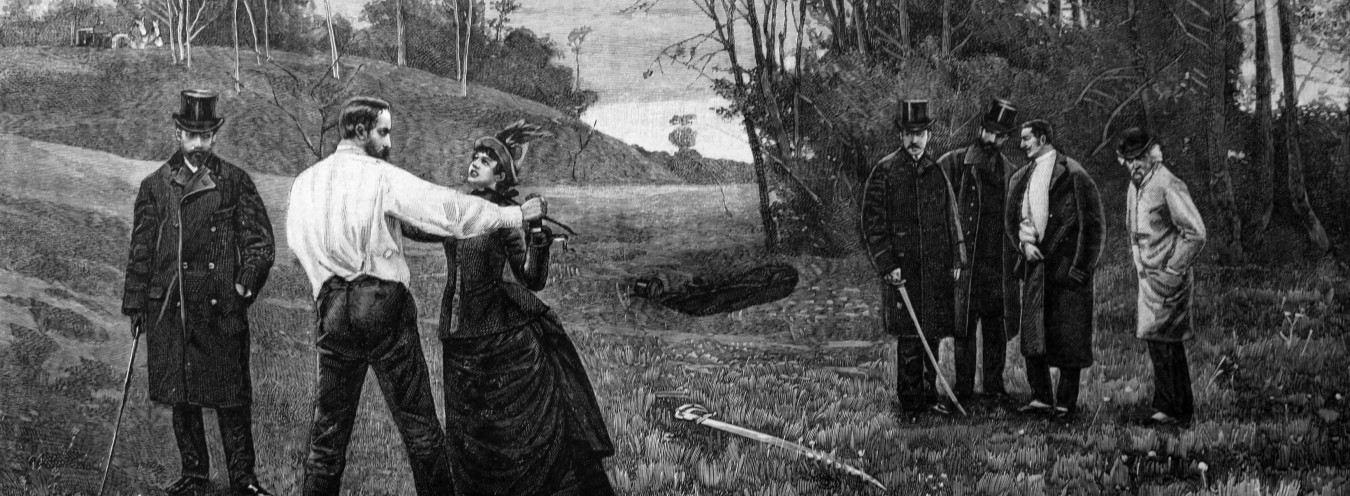
Duel
In that case, I venture to suggest… the opponents to stand at twenty-five paces, take five paces… […] Pistols to be loaded… First blood. (227)
The Doll features frequent mentions of duelling – an armed encounter between two adult men, in defence of the insulted honour of one of the combatants. (Women could not duel; their husbands, brothers, sons or fathers defended their sullied virtue). On the pages of the novel two duels take place, although neither of them is fought to the death: one between Baron Dalski and his wife’s lover, Kazimierz Starski, and the other between Stanisław Wokulski and Baron Krzeszowski. Wokulski’s pretext for demanding satisfaction from the Baron is being jostled by him in the crowd at the races; in fact it is to compensate for the upset Krzeszowski has caused Izabela Łęcka with a malicious comment. Their duel, described in detail, takes place at dawn in the woods in the Warsaw district of Bielany and finishes with a rather grotesque scene in which the faulty lock of a bullet-damaged pistol knocks out the aristocrat’s tooth; after that, everyone says goodbye, much pleased. […] Wokulski was thoughtful, Rzecki delighted by the spirits and civility of the Baron, and only Szuman was cross. […] [T]he doctor glance[d] at Wokulski and mutter[ed]: ‘What savages! And to think I did not call the police about such fools.’
In the second half of the nineteenth century duels were conducted with cold steel (épée, sabre, broadsword) or pistols. The choice of weapon was up to the insulted party, although it was accepted that a civilian had the right to refuse to duel a military man with a broadsword – a weapon that officers were able to use professionally. If it was a fight to the first blood, the shooting or exchange of thrusts had to stop after one of combatants was wounded. Pistol duels were most frequently conducted while walking towards each other from a pre-determined distance; the shortest acceptable distance for the shot was 15 steps (about 12 metres) and the pistols should be identical (or at least their barrels should be of comparable length and calibre) with a fixed sight to facilitate aim. The terms of the encounter were agreed upon in advance by the witnesses (seconds), most frequently friends of the combatants. They also had to supervise the duel and, later, prepare a report on it. Another duty the witnesses had was to provide medical assistance to the combatants – a surgeon should be present at every duel. His intervention could save a wounded man’s life.
In the Warsaw of Prus’s era duels were illegal, and according to the penal code in force at the time (Articles 1497–1512) causing someone’s death or wounding them heavily in a duel carried a sentence of anything between 8 months and 10 years in a maximum-security prison, denial of status rights, and exile into Siberia. If the circumstances of a duel that ended in a death raised any suspicions, the court interpreted it as intentional homicide and passed the maximum sentence. Even challenging somebody to a duel, if discovered by the police, resulted in arrest (for 3 days up to a week), and only reconciliation with no blood spilled exempted the parties from punishment. Hence the popularity of the woods in Bielany as a secluded spot for illegal duels; contemporary press recorded this phenomenon in occasional poems: Gentlemen in tailcoats/Would sometimes appear;/Last wills in their pockets,/Faces pale with fear./They bow to each other/With grace and respect;/Then with swords or with bullets/Their organs dissect (1881).
Although in the nineteenth century duels were a widespread phenomenon, they were increasingly perceived as a barbaric custom that brought shame on the age. The right to demand an armed encounter from an opponent was most frequently associated with aristocratic origins. Therefore, the fact that Baron Krzeszowski accepts the challenge from Wokulski – a Varsovian merchant – is, in a way, a sign of respect: the aristocrat considers his opponent to be his equal. Prus’s novel vividly depicts the changes in mores and the diverse interpretations of the notion of honour in various social strata: for Baron Krzeszowski, duels are an almost everyday occurrence, but when ex-officer Ignacy Rzecki demands satisfaction from travelling salesman Szprott, outraged by the latter’s comments about Wokulski, he hears, If you was to say anything of the sort when you’re sober, I’d go to the police myself, and they’d show you what’s what. To the accusation of having no pride the merchant retorts, shirking the challenge, Don’t I pay my bills, do I sell bad goods, have I ever gone bankrupt? We’ll see who has pride – in Court! Councillor Węgrowicz, who reconciles the participants of the argument, comments: duels were fashionable long ago, not now.
Bibliografia
- J. Naimski, O pojedynkach, Warsaw 1881.
- W. L. Karwacki, Zabawy na Bielanach, Warsaw 1978.
- B. Szyndler, Pojedynki, Warsaw 1987.



